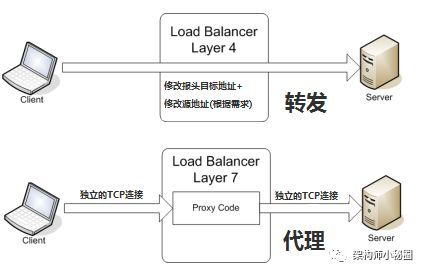一 四层转发和七层转发
1.1四层负载均衡
四层负载均衡工作在OSI模型的传输层,由于在传输层,只有TCP/UDP协议,这两种协议中除了包含源IP、目标IP以外,还包含源端口号及目的端口号。四层负载均衡服务器在接受到客户端请求后,以后通过修改数据包的地址信息(IP+端口号)将流量转发到应用服务器。
1.2七层负载均衡
七层负载均衡工作在OSI模型的应用层,应用层协议较多,常用http、radius、dns等。七层负载就可以基于这些协议来负载。这些应用层协议中会包含很多有意义的内容。比如同一个Web服务器的负载均衡,除了根据IP加端口进行负载外,还可根据七层的URL、浏览器类别、语言来决定是否要进行负载均衡。
二 Nginx4层转发的配置
生产业务中很多端口只能使用tcp连接 比如mysql ssh 这些端口是无法使用普通的7层代理进行转发的 因此需要我们配置nginx的四层转发
2.1 Nginx Dockerfile配置
创建Nginx Dockerfile nginx编译需要–with-stream 模块 否则无法配置
FROM centos:7.8.2003
MAINTAINER huhuhahei
ADD nginx-1.12.0.tar.gz /opt
RUN yum -y install gcc gcc-c++ lrzsz pcre-devel zlib-devel openssl openssl-devel && useradd -M -s /sbin/nologin nginx && cd /opt/nginx-1.12.0/ && ./configure --prefix=/usr/local/nginx --user=nginx --group=nginx --with-http_stub_status_module --with-http_ssl_module --with-stream && make && make install
2.2 创建转发的配置文件
kind: ConfigMap
apiVersion: v1
metadata:
name: nginx-conf
namespace: proxy
data:
nginx.conf: |
user root;
worker_processes auto;
error_log logs/error.log info;
pid logs/nginx.pid;
events {
use epoll;
}
stream {
upstream backend {
server *****:8080 max_fails=3 fail_timeout=30s;
}
server {
listen 8080;
proxy_connect_timeout 1s;
proxy_timeout 3s;
proxy_pass backend;
}
log_format proxy '$remote_addr [$time_local]'
'$protocol $status $bytes_sent $bytes_received'
'$session_time "$upstream_addr" '
'"$upstream_bytes_sent" "$upstream_bytes_received" "$upstream_connect_time"';
access_log /usr/local/nginx/logs/tcp-access.log proxy ;
error_log /usr/local/nginx/logs/tcp-error.log warn ;
}
http {
include /usr/local/nginx/conf/mime.types;
default_type application/octet-stream;
}
2.3 创建Nginx deploy文件
kind: Deployment
apiVersion: apps/v1
metadata:
name: nginx-proxy
namespace: proxy
labels:
app: nginx
spec:
replicas: 1
selector:
matchLabels:
app: nginx
template:
metadata:
labels:
app: nginx
spec:
volumes:
- name: ngin-conf
configMap:
name: ngin-conf
items:
- key: nginx.conf
path: nginx.conf
defaultMode: 420
- name: logs
emptyDir: {}
containers:
- name: nginx
image: 'harbor.huhuhahei.cn/test/nginx_proxy:v2'
command:
- ./usr/local/nginx/sbin/nginx
args:
- '-g daemon off;'
- '-c'
- /opt/nginx.conf
ports:
- containerPort: 8080
protocol: TCP
env:
- name: aliyun_logs_proxy-access-log
value: /usr/local/nginx/logs/tcp-access.log
- name: aliyun_logs_proxy-error-log
value: /usr/local/nginx/logs/tcp-error.log
- name: TZ
value: Asia/Shanghai
resources: {}
volumeMounts:
- name: nginx-conf
mountPath: /opt
- name: logs
mountPath: /usr/local/nginx/logs/
terminationMessagePath: /dev/termination-log
terminationMessagePolicy: File
imagePullPolicy: IfNotPresent
restartPolicy: Always
terminationGracePeriodSeconds: 30
dnsPolicy: ClusterFirst
securityContext: {}
schedulerName: default-scheduler
strategy:
type: RollingUpdate
rollingUpdate:
maxUnavailable: 25%
maxSurge: 25%
revisionHistoryLimit: 10
progressDeadlineSeconds: 600
kind: Service
apiVersion: v1
metadata:
name: nginx-proxy
namespace: proxy
spec:
ports:
- name: proxy
protocol: TCP
port: 8080
targetPort: 8080
selector:
app: nginx
type: NodePort



